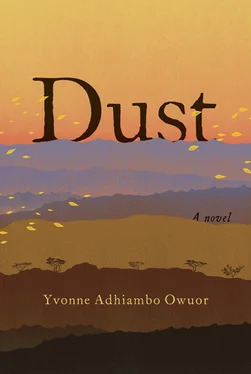A high-pitched wind that night.
“Eeeoiiiah!” A cry pours out of Isaiah.
He sits up and hears echoes of the howl of a wounded beast.
A TAXI DRIVER’S RECOMMENDATION HAD BROUGHT AJANY TO A guesthouse hidden in a Nairobi suburb. A Kenya colonial-style bungalow with wooden floors. Few guests. The round-faced chef, built like a cheerful wrestler, offered Ajany strawberry crêpes and cream at once. His name was Calisto, and his crêpes were the best in the world. The day Ajany arrived, she crawled into bed, and then screamed and screamed into her pillow.
By way of the window into Nairobi night skies, memory had dragged her back into the terrain in Brazil called “Saudade.” Its acual name was “Clube Dorival.” It was evolved by a few of the assorted casualties of music’s broken promises. Saudade’s men showed up in suits and ties and two-toned shoes; its wild-haired women in recycled evening wear that flowed and shed light and molded cloth to all-shape bodies. Desire was communicated through still moments: a way of glaring, for example. Saudade was a crossroads peopled by remnants of the colonized. Portugal-infused Africans, vagabond refugees, wounded immigrants, all in-betweeners, representatives of nations’ detritus, those who had disappeared into “lost” and the merely curious. It was a place of meeting, and sometimes a bordello. Ajany found it five years ago, on an evening of drizzles, after a disheveled woman stepped into her homeward path, palm out, and snarled “Menina” in a too-high voice. A slithery sensation had assailed Ajany, who turned and fled, until the string of the woman’s voice roiling in her head snapped.
She had rushed through a doorway around which elegant Lusophone men stood.
A breathed-out song reached her— Estes braços eternos, curvados sobre as penas —and she followed it into Saudade.
Dark-brown décor, coffee, wine, voices into music, over music, as music, russet mustiness. A blend of spice and perfume, night jasmine too. Aphrodisiac melodies. Chico Buarque and other tunes. It was always dusk there. They were five, the music makers. A slender guitarist, playing with his eyes closed. A percussionist channeling Neguinho do Samba. Singers: two women, plump coquettes in sparkling high heels, who slapped their thighs, clutched breasts, and rolled and rolled their hips. A big man, a blue-black man, seated, a guitar’s stem to his face, right ear pressed close to hear the chords he sometimes gave voice to, crisscrossing scales in clean lament. Bernardo gestured for music from his one-eyed guitarist. Ajany watched a woman in a shiny brown satin dress. The woman moved, climbed the stage, grabbed Bernardo’s arm, and leaned into his ear. He leapt off the creaking stage. He prowled across the room, a pathway creating itself for him while, in a large, gruff voice, sewn together with laughter, he called for drinks all round.
Ajany was still staring from a stool in the back of the room. And then he was there.
He said, “Mulhere!”
She tried to leave.
Before he touched her.
Her body shook.
He grinned, put both his arms around her. “I’m taking you home with me.”
She shivered next to him.
“Cold?” He spoke into her ear.
She said nothing.
“Wait for me.” He laughed.
He had gone.
Ajany left.
Ajany would paint him that night. Furious violet and dark-blue hues, rubbed into paper with fingers.
She returned the next evening.
Bernardo found her.
They left together.
She did not care.
And for an entire season she forgot about Wuoth Ogik.
Then she wrote home.
Dear Odidi, I am happy .
Bernardo said, “Song is sorcery.”
He said, “You are the voice of my dark.”
He said, “I called you into my madness.”
She listened. It did not occur to either of them that she, too, might speak. Laughter, anguish, moans of relentless, endless, deep filling. Feeling. He played her body, too. He loved her, he said. “Loving you, I live.” And her body opened a way for her soul to fall into his.
She wrote. Dear Odidi, I love. I am loved .
Bernardo said her madness was not African enough. “I feel … authenticity.… That’s your dilemma.” It was the first time she would cry because of him.
But.
Seduction: the house of forgetfulness.
She did not write home.
Ajany opens her eyes and discovers she is in Nairobi. Sun-sprinkled pale-orange light through white veils. Ajany jumps out of bed, lands on the floor a meter away. A habit devised to avoid Obarogo.
Calisto the chef offers mulberry crêpes.
“No,” says Ajany.
“English breakfast?” His hands clasped partly in prayer.
“No,” she stutters. “Just tea.”
His jaw sags. “Is my food bad?”
Ajany murmurs, “Crêpes.”
Calisto grins.
Other people’s English breakfast. Bacon. The meat smell evokes the morgue. Ajany gets up, grabs the orange juice, and heads for the garden. A cold morning, but she can eat her crêpes there.
She calls up yesterday’s taxi driver. His name is Peter. He communes with God. He says he has to. “Not all passengers are good.”
She can understand.
He asks, “You’re from where, madam?”
“Here.”
“Where?”
“N-north.”
“Where?”
“Kalacha …”
“Where?”
“Northern Kenya.”
“ Ngai! That’s far.… You don’t look like you’re from those sides.”
She turns.
“What do they look like?”
Peter frowns.
They stop in front of a sweating policeman who is choreographing the traffic flow and creating a logjam.
“Business in Nairobi?”
“Yes,” she sighs, staring out of the window.
The policeman points, and they crawl into their lane on the roundabout. Destination, the University of Nairobi, Department of Civil Engineering and Material Sciences, near the street where Ajany last smelled Odidi’s student-budget cologne.
ENGINEER OPIRR IS A BAG-EYED MAN WITH A BIG OVAL FACE ON which a verdant sprouting of white-streaked hairs flourish on an elongated jaw. His crimson suspenders lift dark-blue trousers above his stomach. A large oval ring set with turquoise and coral bulges from his third left-hand finger. Odidi’s former tutor. He ushers Ajany into his book-choked, paper-filled office.
“Odidi’s little sister! Aha-ha, indeed, indeed!” A flourish. “What can I do for her?”
“I’m … uh … looking for Odidi.”
They sit down. Between them a perfect round dark-brown table weighed down with books about bridges, notepads, written papers, five rectangular containers stuffed with cards, and an incongruous delicate pink-blue flowered china cup, with its saucer and a thin, etched silver spoon.
“I graduated the boy, you know.” Odidi as a theme gave him warm feelings. A most excellent student.
Ajany waits.
“In this age of technology, would’ve thought …?”
“Lost contact.”
Opirr plucks at his face, eyes missing little. “Mhh.”
“Just came home,” she elaborates, “Looking for him.”
She believed it.
Engineer Opirr observes the structural dysfunction in the otherwise well-put-together frame of the female in front of him. Leaking from her eyes. “Tea? Hard times for our blessed nation, what? Must have faith. Our young are still unsullied, eh?” Opirr pours out liquid into another floral cup. “Oolong tea,” Opirr confides. “Mix leaves with crushed dek , food for the heart. Sandwich?”
“No, thank you,” Ajany replies.
Engineer Opirr plunks himself down on a ratty couch. “Lost touch myself.”
Читать дальше











